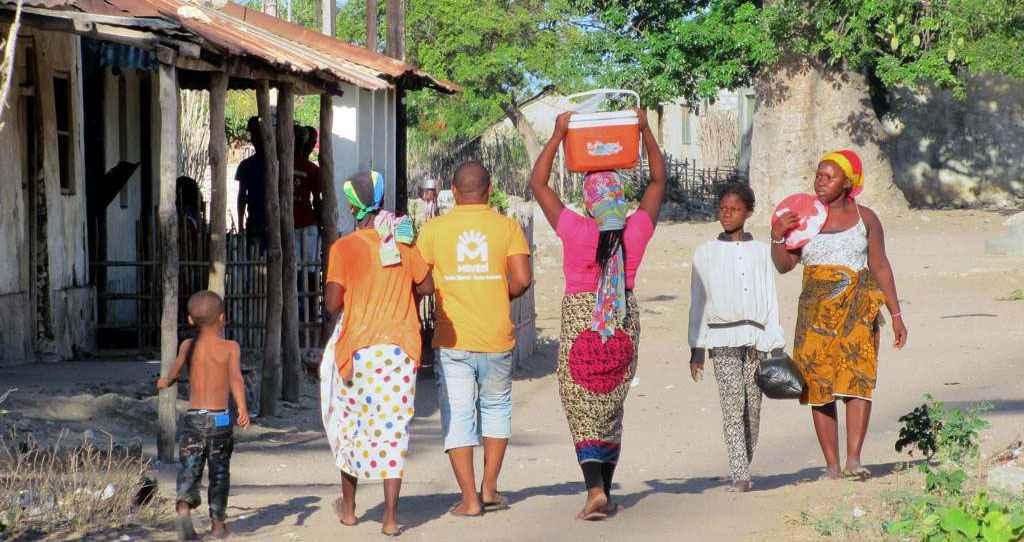Mozambique Institutional Diagnostic

Photo of local residents in Ibo Island, Mozambique (via Flickr, David Stanley)
The Mozambique Institutional Diagnostic (MID) study officially started in February 2019 under a contract with the Development Economics Research Group (DERG) of the University of Copenhagen, in coordination with activities supported by DERG and UNU-WIDER in Mozambique. The Mozambique study is the fourth and final country study under EDI’s institutional diagnostic work and accompanies earlier studies in Tanzania, Benin and Bangladesh. Future work under this research theme will now focus on a synthesis of all country studies to be published later in 2021.
The methodology for designing the EDI Institutional Diagnostic tool relies on in-depth case studies of a select group of countries, aimed at comprehensively exploring the relationship between the characteristics and functioning of a country’s institutions and its economic development performance and constraints. The MID study builds on the methodology developed for the previous country studies, incorporating lessons from each.
Download an overview of the methodology and approach to this project
Draft working papers of the Mozambique Institutional Diagnostic were published in October 2020. Links to the chapters are below.
Mozambique Institutional Diagnostic: Table of Contents
- Finn Tarp, Development Economics Research Group, University of Copenhagen
- Ines A. Ferreira, Development Economics Research Group, University of Copenhagen
- Johnny Flentø, Development Economics Research Group, University of Copenhagen
- Antonio S. Cruz, Independent contractor
Part 1: General approach to the diagnostic
Chapter 1. Introduction and overview
- Ines A. Ferreira, Development Economics Research Group, University of Copenhagen
- Finn Tarp, Development Economics Research Group, University of Copenhagen
Chapter 2. Historical, political and economic background
- Antonio S. Cruz, Independent contractor
- Ines A. Ferreira, Development Economics Research Group, University of Copenhagen
- Johnny Flentø, Development Economics Research Group, University of Copenhagen
- Sam Jones, UNU-WIDER; Development Economics Research Group, University of Copenhagen
- Finn Tarp, Development Economics Research Group, University of Copenhagen
Chapter 3. Institutional performance: international datasets, quantitative survey and key informants
- Antonio S. Cruz, Independent contractor
- Ines A. Ferreira, Development Economics Research Group, University of Copenhagen
- Johnny Flentø, Development Economics Research Group, University of Copenhagen
- Finn Tarp, Development Economics Research Group, University of Copenhagen
Part 2: Thematic Studies
Chapter 4. The relative neglect of agriculture in Mozambique
- João Z. Carrilho, Observatório do Meio Rural (OMR), Maputo, Mozambique
- Ines A. Ferreira, DERG, Department of Economics, University of Copenhagen, Denmark
- Rui N. Ribeiro, Observatório do Meio Rural (OMR), Maputo, Mozambique
- Finn Tarp, DERG, Department of Economics, University of Copenhagen, Denmark
Chapter 5. Putting the financial system at the service of the poor and SMEs*
- Abdul Magid Osman
- Djamila Pontes Osman
- Mouzinho Mário, Eduardo Mondlane University, Maputo, Mozambique
- Celso M. Monjane, Joaquim Chissano University, Maputo, Mozambique
- Ricardo Santos, UNU-WIDER, Helsinki, Finland
Chapter 7. Health, development and institutional factors: the case of Mozambique
- Ivo Garrido, Clínica 222, Maputo, Mozambique
Chapter 8. Decentralization reforms in Mozambique: The role of institutions in defining results
- Salvador Forquilha, Institute of Social Studies and Economics (IESE), Maputo, Mozambique
Chapter 9. The saga and limits of public financial management: The Mozambican case
- António S. Cruz, DERG, Department of Economics, University of Copenhagen, Denmark
- Ines A. Ferreira, DERG, Department of Economics, University of Copenhagen, Denmark
- Johnny Flentø, DERG, Department of Economics, University of Copenhagen, Denmark
- Finn Tarp, DERG, Department of Economics, University of Copenhagen, Denmark
- Mariam Umarji, Instituto de Higiene e Medicina Tropical, Universidade Nova de Lisboa, Lisbon, Portugal
Chapter 10. Rule of law and judicial independence
- João Carlos Trindade, Retired judicial magistrate, current chair of the governing board of the non-governmental organization Centro Terra Viva – Environmental Studies and Advocacy (CTV), Maputo, Mozambique
Chapter 11. Donor relations and sovereignty
- Johnny Flentø, Development Economics Research Group, University of Copenhagen
- Leonardo Santos Simao, Former Minister of Health, Former Minister of Foreign Affairs & Cooperation, Government of
Mozambique, Maputo, Mozambique
Chapter 12. Natural resources, institutions, and economic transformation in Mozambique
- José Jaime Macuane, Departamento de Ciência Política e Administração Pública, Universidade Eduardo Mondlane, Moçambique
- Carlos Muianga, Instituto de Estudos Sociais e Económicos, Moçambique
Part 3: Synthesis
Chapter 13. Synthesis and policy recommendations
- Antonio S. Cruz, Independent contractor
- Ines A. Ferreira, Development Economics Research Group, University of Copenhagen
- Johnny Flentø, Development Economics Research Group, University of Copenhagen
- Finn Tarp, Development Economics Research Group, University of Copenhagen
*These working papers are not published on the EDI website, see the Inclusive Growth in Mozambique (IGM) project web-site




